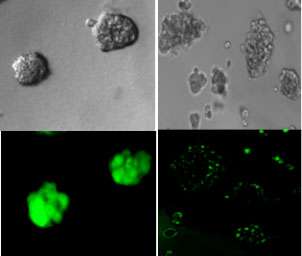Bacterial 'communication system' could be used to stop and kill cancer cells

Cancer, while always dangerous, truly becomes life-threatening when cancer cells begin to spread to different areas throughout the body. Now, researchers at the University of Missouri have discovered that a molecule used as a communication system by bacteria can be manipulated to prevent cancer cells from spreading. Senthil Kumar, an assistant research professor and assistant director of the Comparative Oncology and Epigenetics Laboratory at the MU College of Veterinary Medicine, says this communication system can be used to "tell" cancer cells how to act, or even to die on command.
"During an infection, bacteria release molecules which allow them to 'talk' to each other," said Kumar, the lead author of the study. "Depending on the type of molecule released, the signal will tell other bacteria to multiply, escape the immune system or even stop spreading. We found that if we introduce the 'stop spreading' bacteria molecule to cancer cells, those cells will not only stop spreading; they will begin to die as well."
In the study published in PLOS ONE, Kumar, and co-author Jeffrey Bryan, an associate professor in the MU College of Veterinary Medicine, treated human pancreatic cancer cells grown in culture with bacterial communication molecules, known as ODDHSL. After the treatment, the pancreatic cancer cells stopped multiplying, failed to migrate and began to die.
"We used pancreatic cancer cells, because those are the most robust, aggressive and hard-to-kill cancer cells that can occur in the human body," Kumar said. "To show that this molecule can not only stop the cancer cells from spreading, but actually cause them to die, is very exciting. Because this treatment shows promise in such an aggressive cancer like pancreatic cancer, we believe it could be used on other types of cancer cells and our lab is in the process of testing this treatment in other types of cancer."
Kumar says the next step in his research is to find a more efficient way to introduce the molecules to the cancer cells before animal and human testing can take place.
"Our biggest challenge right now is to find a way to introduce these molecules in an effective way," Kumar said. "At this time, we only are able to treat cancer cells with this molecule in a laboratory setting. We are now working on a better method which will allow us to treat animals with cancer to see if this therapy is truly effective. The early-stage results of this research are promising. If additional studies, including animal studies, are successful then the next step would be translating this application into clinics."
More information: PLOS ONE, www.plosone.org/article/info%3Adoi%2F10.1371%2Fjournal.pone.0106480
















